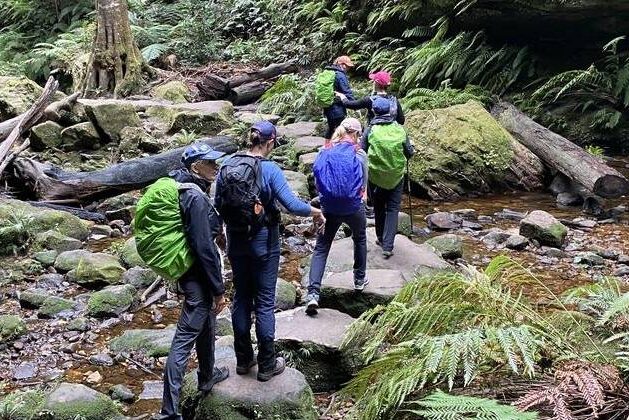
By Lisa Martin
Women who love the outdoors but are reluctant to venture into the wilderness alone can now benefit from safety-in-numbers.
It’s a decade since Reese Witherspoon’s solo trek in the film Wild inspired a generation to lace up their hiking boots.
But many Australian women feel unsafe alone in the bush and are increasingly seeking gal pals to explore the great outdoors.
Standing beneath a waterfall and rocky ledges lined with ferns and moss, a group of women trekkers in colourful raincoats bask in the crisp air of the Blue Mountains in the 400-metre-deep Grand Canyon.
Mile-long to-do lists, overflowing email inboxes and the seemingly impossible juggle of work and family life melt away in the canyon’s ancient rainforest gullies.
“Hiking in the Australian bush is my happy place,” says Cathy Grant who is on the trek with her adult daughter and a dozen others.
“Our lives are so busy, always racing from one thing to the next that we can forget to notice the beauty around us.”
A recent viral TikTok video sparked a global debate about women’s safety in the wilderness after seven out of eight women interviewed in the clip said they would rather be stuck in a forest with a bear than a man.
Frith Graham – the founder of GirlsTrek, a Brisbane-based tour operator specialising in women-only hikes across Australia and overseas – says safety fears are “definitely a factor” in the surge of bookings in recent years, with women seeking ways to counter vulnerabilities but still connect with nature.
Group treks offered a special kind of social engagement, Ms Graham notes.
“The connection to nature, to others and to self are equally as important as improved lung capacity, stronger muscles and endurance,” she says.
“(There’s) happiness and belonging being encircled each day by truly interesting… women sharing part of your life’s path.”
Over four days exploring iconic Blue Mountains trails, camaraderie builds – turning strangers into friends – a young mum-of-three needing some ‘me time’ gets to know a duo of doctors.
While existing ties also deepen – a group of lifelong friends in their 50s and early 60s recall nostalgically the days of shepherding their children at the school gates.
They used to get lost in Melbourne department stores on annual girls’ trips but now delight in getting lost in the bush together.
Jokes flow about the ”smell of Dencorub overpowering Miss Dior perfume” and hiking holidays being “calorie neutral”.
But designated quiet time or “forest bathing” brings a sense of euphoria as the group climbs towards Evans Lookout.
A faint note of eucalyptus hangs in the air and the group savours the distant calls of yellow-tailed black cockatoos, the sounds of trickling water and boots crunching on the rocky steps.
In the 1980s, Japan coined the term ”shinrin-yoku” or forest bathing as an antidote to its notorious death by overwork (Karoshi) culture.
“I find forest bathing a spiritual experience, taking in the sounds of the bush surrounded by the deep peace of the natural world,” Ms Grant says.
Scientific studies show carving out ‘tree time’ can boost mood and focus, reduce stress hormones and improve sleep quality.
“Problems halve when you give your sensory system some calming bush therapy. Sunrises, sunsets, tree branches swaying in the breeze, sun on your back, and the rhythm of footfalls as you move along the wilderness trail, bring the gift of perspective,” Ms Graham says.
Psychologist and author of How I Rescued My Brain, David Roland, champions forest bathing as a mental health tool and says trees have become his “consulting room”.
“Physiologically, we benefit from the volatile organic compounds emitted by trees and wooded plants boosting our immune system and from negative ions found in greater abundance near water and in broad-leafed forests,” he says.
Our digital world and goal-focused lifestyles encourage left-brain, logical and solution-focused thinking and people suffer from mental fatigue from screen time, Mr Roland says.
He says forest bathing encourages right-brain thinking or present-moment focus which helps people see the bigger picture.
“For these reasons, we can experience personal and creative insights that are less likely to occur otherwise,” he says.
As she hikes past bush candelabras – banksias the size of corn cobs – Ms Grant reflects that the non-competitiveness of trekking helps soothe mind and body.
“No one’s trying to get to the destination first or prove they are fitter than the rest of us. We chat, and help each other over any rough or tough terrain,” she says.
The writer hiked in the Blue Mountains as a guest of GirlsTrek.
Who can be trusted?
In a world of spin and confusion, there’s never been a more important time to support independent journalism in Canberra.
If you trust our work online and want to enforce the power of independent voices, I invite you to make a small contribution.
Every dollar of support is invested back into our journalism to help keep citynews.com.au strong and free.
Thank you,
Ian Meikle, editor









Leave a Reply